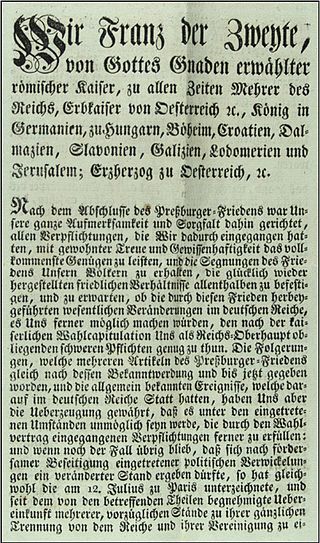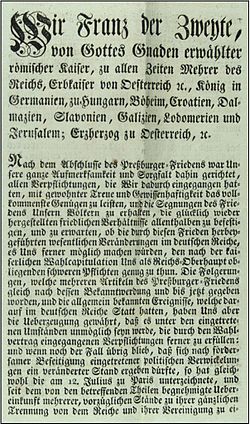热门问题
时间线
聊天
视角
神聖羅馬帝國解體
来自维基百科,自由的百科全书
Remove ads
神聖羅馬帝國解體(英語:Dissolution of the Holy Roman Empire),指的是一個發生在1806年8月6日,最後一位神聖羅馬皇帝哈布斯堡-洛林家族的法蘭茲二世公開宣佈放棄其皇帝頭銜,允許帝國內的全部德意志邦國獨立,並讓帝國臣民、官員、貴族的義務、責任、爵位和誓言即刻作廢的歷史事件。
Remove ads
自歐洲中世紀以來,神聖羅馬帝國因其皇帝被教皇冊封為「羅馬人的國王」而被西歐人認定為古羅馬帝國的合法延續以及拉丁基督教界的世俗領袖。通過這一羅馬的遺產,神聖羅馬帝國皇帝聲稱自己是普世君主,其管轄範圍超出其帝國的正式邊界,延伸至整個基督教歐洲及其他地區。神聖羅馬帝國的衰落是一個持續幾個世紀的漫長過程。首先始於三十年戰爭對德意志地區經濟和人口的摧殘,這場戰爭同時使得哈布斯堡家族的實力大大受損,帝國南北被嚴重割裂為相互敵視的公教和新教兩派。隨後是16和17世紀第一個現代主權領土國家的形成,這帶來了管轄權對應於實際管轄領土的觀念,威脅到神聖羅馬帝國的普世性。
18世紀時的神聖羅馬帝國被帝國內外的同時代人廣泛認為是高度「不規則」和「病態」的君主制,具有「不尋常」的政府形式。帝國既沒有中央常備軍也沒有中央國庫,其君主是選舉而非世襲的,無法行使有效的中央集權,隨著時間的發展變得越發格格不入。即使在那時,大多數同時代人都相信帝國可以復興和現代化。在18世紀末捲入法國大革命戰爭和拿破崙戰爭之後,神聖羅馬帝國終於開始了真正的衰落。
儘管帝國最初防禦得很好,但與法國和拿破崙的戰爭證明是災難性的。1804年拿破崙宣布自己為法國人的皇帝,神聖羅馬皇帝法蘭茲二世對此做出回應,宣布自己為奧地利皇帝法蘭茲一世,以此試圖維持法國和奧地利之間的平等,同時也說明了神聖羅馬帝國的頭銜比他們都高。1805年12月奧地利在災難性的奧斯特里茨戰役中戰敗,第三次反法同盟以失敗告終。1806年7月,法蘭茲二世的德意志附庸大量脫離,組成法國的衛星國萊茵邦聯,這意味著事實上神聖羅馬帝國的終結。1806年8月的退位,加上整個帝國等級制度及其機構的解散,被認為是防止拿破崙宣布自己為神聖羅馬帝國皇帝的可能性所必需的,這使得法蘭茲二世最終淪為了拿破崙的附庸。
同時代的人對帝國解體的反應從冷漠到絕望不等。哈布斯堡君主國首都維也納的民眾對帝國的終結感到震驚。許多法蘭茲二世的前臣民質疑他的行為是否合法;儘管他的退位被認為是完全合法的,但帝國的解體和所有附屬國的離去被視為超出了皇帝的權力。因此,許多帝國的親王和臣民拒絕接受帝國已經消失的事實,一些平民甚至認為帝國解體的消息是地方當局的陰謀。在德意志地區,這場解體被廣泛比作古代的特洛伊城陷落,一些人將他們認為是羅馬帝國的終結,並與世界末日和天啟聯繫起來。
Remove ads
參考資料
- Berg, Scott M. In the Shadow of Joesphinism: Austria and the Catholic Church in the Restoration, 1815-1848. Louisiana State University Master's Thesis. 2010 [2023-01-23]. (原始內容存檔於2023-07-04).
- Blanning, Tim. The Holy Roman Empire of the German Nation past and present. Historical Research. 2012, 85 (227): 57–70. doi:10.1111/j.1468-2281.2011.00579.x.
- Burgdorf, Wolfgang. ‘Once we were Trojans!’ Contemporary Reactions to the Dissolution of the Holy Roman Empire of the German Nation. Evans, Robert; Wilson, Peter H. (編). The Holy Roman Empire, 1495-1806: A European Perspective. Brill. 2012. ISBN 978-90-04-20683-0.
- Bryce, Viscount James Bryce. The Holy Roman Empire. Good Press. 2019 [1864]. ASIN B081TFMGRC.
- Chaloupek, Günther. The Congress of Vienna and the Emerging Rivalry between Austria and Prussia for Hegemony in Central Europe. Contribution to the 28th Heilbronn Symposion in Economics and the Social Sciences. 2015 [2023-01-23]. (原始內容存檔於2023-01-27).
- Correspondence Respecting the Affairs of Italy: 1846–1847. Harrison and Son. 1847.
- Datta, Pietro Luigi. Lezioni di paleografia e di critica diplomatica sui documenti della monarchia de Savoia. Coi tipi di G. Pomba. 1834.
- Davies, Norman. Vanished Kingdoms: The Rise and Fall of States and Nations. Penguin. 2012. ISBN 9780143122951.
- Flockerzie, Lawrence J. Saxony, Austria, and the German Question after the Congress of Vienna, 1815-1816. The International History Review. 1990, 12 (4): 661–687. JSTOR 40106275. doi:10.1080/07075332.1990.9640563.
- Gagliardo, John G. Reich and Nation: The Holy Roman Empire as Idea and Reality, 1763–1806. Indiana University Press. 1980. ISBN 978-0253167736.
- Godsey, William D. Nobles and Nation in Central Europe: Free Imperial Knights in the Age of Revolution, 1750–1850. Cambridge: Cambridge University Press. 2004.
- Harrison, Henrietta. The Qianlong Emperor's Letter to George III and the Early-Twentieth-Century Origins of Ideas about Traditional China's Foreign Relations. The American Historical Review. 2017, 122 (3): 680–701 [2023-01-23]. doi:10.1093/ahr/122.3.680. (原始內容存檔於2022-12-28).
- Lentz, Thierry. Napoleon and Charlemagne. Napoleonica. La Revue. 2008, 1: 45–68 [2023-01-23]. doi:10.3917/napo.081.0002. (原始內容存檔於2017-06-30).
- Morris Jr., Warren B. The Prussian Plan of Union: Traditional Policy by "Revolutionary" Means. The Historian. 1977, 39 (3): 515–530. doi:10.1111/j.1540-6563.1977.tb01200.x.
- Muldoon, James. Empire and Order: The Concept of Empire, 800–1800. Springer. 1999. ISBN 978-1-349-39644-3. doi:10.1057/9780230512238.
- Orford, Anne. Jurisdiction Without Territory: From the Holy Roman Empire to the Responsibility to Protect. Michigan Journal of International Law. 2009, 30 (3): 981–1015 [2023-01-23]. (原始內容存檔於2022-12-05).
- Renna, Thomas. Papal Approval of Holy Roman Emperors, 1250–1356. Expositions. 2017, 11 (2): 57–90 [2023-01-23]. (原始內容存檔於2022-12-28).
- Watson, Alexander. Ring of Steel: Germany and Austria-Hungary in World War I. Basic Books. 2014. ISBN 978-0465018727.
- Whaley, Joachim. Germany and the Holy Roman Empire, Volume II: The Peace of Westphalia to the Dissolution of the Reich, 1648–1806. Oxford: Oxford University Press. 2012.
- Wilson, Peter H. Bolstering the Prestige of the Habsburgs: The End of the Holy Roman Empire in 1806. The International History Review. 2006, 28 (4): 709–736. S2CID 154316830. doi:10.1080/07075332.2006.9641109.
- Wilson, Peter H. The Meaning of Empire in Central Europe around 1800. Forrest, Alan; Wilson, Peter H. (編). The Bee and the Eagle: Napoleonic France and the End of the Holy Roman Empire, 1806. Palgrave Macmillan. 2009. ISBN 978-0-230-00893-9.
- Wilson, Peter H. Heart of Europe: A History of the Holy Roman Empire. Cambridge, MA: Belknap Press. 2016.
Remove ads
Wikiwand - on
Seamless Wikipedia browsing. On steroids.
Remove ads

